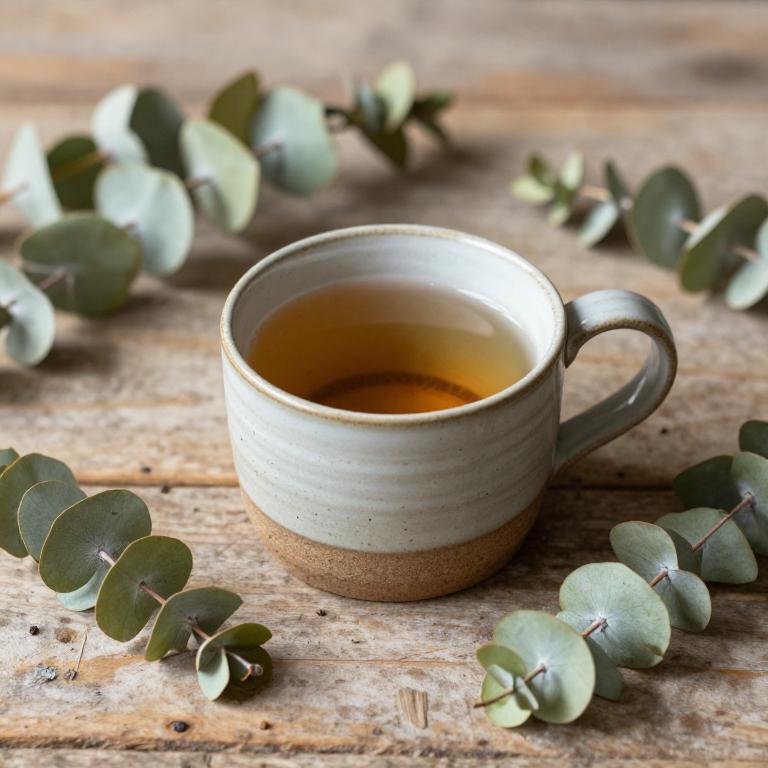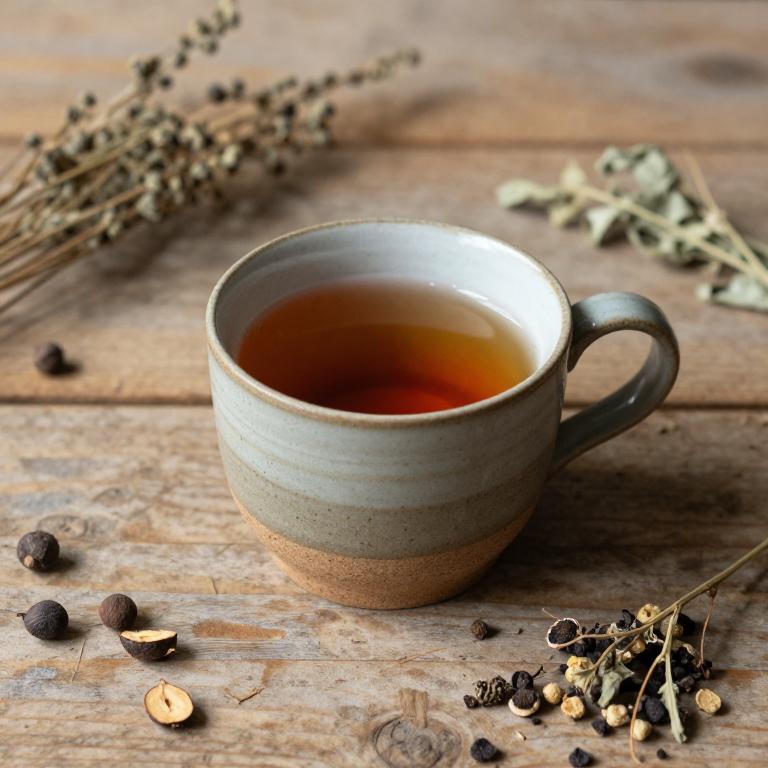10 Best Herbal Teas For Bronchitis

Herbal teas can be a natural and soothing remedy for managing symptoms of bronchitis, offering gentle relief without the side effects of over-the-counter medications.
Common herbs used in bronchitis teas include licorice root, which helps soothe irritated airways, and eucalyptus, known for its decongestant properties. Peppermint and ginger are also frequently included to reduce inflammation and ease coughing. These teas work by promoting expectoration, reducing mucus buildup, and calming the respiratory system.
While they can provide symptomatic relief, it is important to consult a healthcare provider for persistent or severe bronchitis to rule out more serious conditions.
Table of Contents
- 1. Thyme (Thymus vulgaris)
- 2. Eucalyptus (Eucalyptus globulus)
- 3. Chamomile (Matricaria chamomilla)
- 4. Ginger (Zingiber officinale)
- 5. Stinging nettle (Urtica dioica)
- 6. Rosemary (Rosmarinus officinalis)
- 7. Salvia (Salvia officinalis)
- 8. Fennel (Foeniculum vulgare)
- 9. Ceylon cinnamon (Cinnamomum zeylanicum)
- 10. Peppermint (Mentha piperita)
1. Thyme (Thymus vulgaris)

Thymus vulgaris, commonly known as thyme, is a popular herb used in herbal teas to support respiratory health, including relief from symptoms of bronchitis.
The essential oils in thyme, particularly thymol, possess strong antibacterial and anti-inflammatory properties that can help reduce mucus buildup and soothe irritated airways. When brewed into a tea, thyme can provide a warming effect that may ease coughing and improve breathing. It is often combined with other herbs like licorice root or eucalyptus to enhance its therapeutic benefits.
While thyme tea is generally safe for most people, it is advisable to consult a healthcare professional before use, especially for those with existing medical conditions or taking medications.
2. Eucalyptus (Eucalyptus globulus)

Eucalyptus globulus, commonly known as eucalyptus oil, is often used in herbal teas to support respiratory health, particularly in cases of bronchitis.
These teas are believed to help ease symptoms such as coughing, congestion, and difficulty breathing by promoting mucus clearance and reducing inflammation in the airways. The active compounds in eucalyptus, such as eucalyptol, have antimicrobial and expectorant properties that may aid in soothing irritated bronchial passages. While herbal teas made from eucalyptus globulus can be a natural complement to bronchitis treatment, they should not replace medical advice or prescribed medications.
It is important to consult a healthcare professional before using eucalyptus-based remedies, especially for individuals with allergies or underlying health conditions.
3. Chamomile (Matricaria chamomilla)

Matricaria chamomilla, commonly known as chamomile, is a herbal tea often used for its calming and anti-inflammatory properties.
While it is traditionally used for digestive issues and sleep support, some studies suggest it may also offer relief for respiratory conditions like bronchitis due to its potential to reduce inflammation and soothe the airways. The active compounds in chamomile, such as flavonoids and essential oils, may help ease coughing and reduce mucus production in the respiratory tract. However, it is important to note that chamomile should not replace prescribed medical treatments for bronchitis and should be used as a complementary therapy under the guidance of a healthcare professional.
As with any herbal remedy, individual responses may vary, and it is advisable to consult a physician before incorporating chamomile into a treatment plan for bronchitis.
4. Ginger (Zingiber officinale)

Zingiber officinale, commonly known as ginger, is often used in herbal teas to support respiratory health, including in cases of bronchitis.
The active compounds in ginger, such as gingerol and shogaol, possess anti-inflammatory and antioxidant properties that may help reduce airway inflammation and ease breathing. Drinking ginger tea can soothe coughing and help clear mucus from the lungs, providing relief from bronchitis symptoms. It is typically prepared by steeping fresh or dried ginger root in hot water, and can be enhanced with honey or lemon for added benefits.
While ginger tea is generally safe, it should not replace professional medical advice, especially for severe or chronic bronchitis cases.
5. Stinging nettle (Urtica dioica)

Urtica dioica, commonly known as stinging nettle, has been traditionally used in herbal teas to support respiratory health, including the management of bronchitis.
The leaves of this plant contain anti-inflammatory compounds such as flavonoids and polyphenols, which may help reduce inflammation in the airways. When brewed into a tea, urtica dioica can soothe irritated mucous membranes and ease coughing associated with bronchial irritation. It is often combined with other herbs like thyme or ginger to enhance its therapeutic effects.
While it is generally considered safe, individuals with allergies to plants in the Urticaceae family should exercise caution before using stinging nettle tea.
6. Rosemary (Rosmarinus officinalis)

Rosmarinus officinalis, commonly known as rosemary, is a fragrant herb often used in herbal teas to support respiratory health.
Its essential oils contain compounds like camphor and rosmarinic acid, which may help reduce inflammation and ease symptoms of bronchitis. When brewed into a tea, rosemary can act as a natural decongestant, helping to clear mucus and improve breathing. However, it is important to consult a healthcare professional before using rosemary tea, especially for those with existing health conditions or who are taking medications.
While rosemary tea may provide some relief, it should not replace prescribed treatments for bronchitis.
7. Salvia (Salvia officinalis)

Salvia officinalis, commonly known as sage, has been traditionally used in herbal teas to support respiratory health, including the management of bronchitis.
The tea is believed to possess anti-inflammatory and antimicrobial properties that may help reduce bronchial irritation and combat infections. Sage tea can soothe coughing and ease throat discomfort, making it a popular remedy for symptoms associated with bronchitis. It is often prepared by steeping dried sage leaves in hot water for several minutes to extract its beneficial compounds.
While sage tea may offer relief, it is advisable to consult a healthcare professional before using it as a treatment for chronic or severe bronchitis.
8. Fennel (Foeniculum vulgare)

Foeniculum vulgare, commonly known as fennel, is a popular herbal remedy used in teas to support respiratory health, including the treatment of bronchitis.
The essential oils in fennel, particularly anethol, have mild expectorant properties that help loosen mucus and ease coughing, making it beneficial for those suffering from bronchial inflammation. Fennel tea is often consumed warm, either alone or combined with other herbs like licorice or thyme, to enhance its soothing effects on the respiratory system. It is generally considered safe for most adults when used in moderation, though it should be avoided during pregnancy and by individuals with known allergies.
Regular consumption of fennel tea may help reduce bronchitis symptoms and promote overall respiratory wellness.
9. Ceylon cinnamon (Cinnamomum zeylanicum)

Cinnamomum zeylanicum, commonly known as cinnamon, is often used in herbal teas to support respiratory health, including the management of bronchitis.
The essential oils found in cinnamon, such as cinnamaldehyde and eugenol, possess anti-inflammatory and antimicrobial properties that may help reduce bronchial irritation and combat respiratory infections. When brewed into a warm tea, cinnamon can soothe the throat and ease coughing, providing relief from the discomfort associated with bronchitis. However, it is important to note that while cinnamon tea may offer symptomatic relief, it should not replace prescribed medical treatments for chronic or severe bronchitis.
As with any herbal remedy, it is advisable to consult a healthcare professional before incorporating cinnamon into a treatment plan for bronchial issues.
10. Peppermint (Mentha piperita)

Mentha piperita, commonly known as peppermint, is a popular herb used in herbal teas to support respiratory health, including the treatment of bronchitis.
The essential oils in peppermint, such as menthol, have soothing and anti-inflammatory properties that can help reduce coughing and ease bronchial irritation. Peppermint tea is often recommended for its ability to act as a natural decongestant, promoting easier breathing and clearing mucus from the airways. It can be consumed warm to enhance its therapeutic effects and provide a calming effect on the body.
However, individuals with certain medical conditions or those taking specific medications should consult a healthcare professional before using peppermint tea as a treatment for bronchitis.